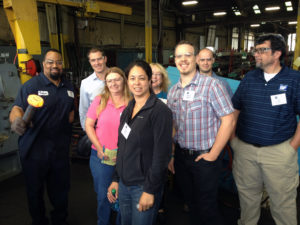Written by John Wachman, Managing Director
Fastener Training Institute

The Fastener Training Institute’s (FTI) core purpose is to enhance fastener use, reliability, and safety by providing fastener product and technical training at all levels. FTI does so by providing beginning and advanced courses with hands-on training opportunities.
Prior to the 1970s, most fasteners were produced domestically by U.S. manufacturers. Typically, these companies employed field sales executives and engineers to work with distributors and end users on the proper fastener selection and installation. These workers were backed by factory-based product managers and application engineers.
For example, one major supplier had 65 business development executives working throughout the country to support its customer base. Product support was also available for each component type, including bolts, sockets, screws, nuts, washers, and so on.
Eventually, however, the majority of fastener production moved overseas. This was simply a matter of economics, which occurred relatively slowly at first and then the shift accelerated as emerging countries began developing more solid manufacturing facilities. Of course, it was unwise to begin with major aerospace or automobile parts, so smaller components such as fasteners provided an ideal manufacturing place to start.
The overseas manufacturing trend continues and, even today, most commodity standard fasteners are imported. Although the U.S. has since revitalized its share of fastener manufacturers, most supply higher quality, engineered fasteners. Certainly, some standard fasteners are produced in America, but suppliers must fight to be competitive. Domestic producers continue to offer great product support, but they are typically lean and product support is limited by economics.
Over the years, less local manufacturing has led to two challenges:
1. Knowledge drain. Overall, a lack of local experience and knowledge about the entire manufacturing process means there’s a “knowledge drain” in the industry. Compounding this concern are the efficiencies companies have employed over the last three decades to save costs. For the most part, this has meant doing more with fewer people. As with many companies worldwide, fastener resellers and end users also had to get lean.
2. Tribal knowledge. There are several people retiring but without an immediate successor who has been in the industry and gained the experience necessary to take properly over the role. Now when people retire, those who step into their positions are lucky to have a few years of experience under their belt, never mind 20 or 30 years, which used to be the case.
However, the passing on of tribal knowledge takes time. With a gap in talent, there’s a risk that the tribal or historical knowledge could be lost. The burden on these newly promoted folks to get up to speed is enormous.

Students from one of the Fastener Training Institute’s advanced courses. FTI provides training on fastener products, standards, and specifications for students of all levels and experience.
Why training matters
Given these concerns, how can the industry support smaller producers and their staff with product information and training? The answer is training.
Employees that specify, order, and install fasteners must have a good background in fasteners. The integrity, reliability, and safety of assembled products depend on an educated fastener supply chain. For example, fasteners do experience failures.
However, it’s rarely the result of faulty components and more likely because the wrong fasteners were specified, or they were improperly installed. Proper training aims to prevent such occurrences.
Here’s what to look for in a fastener training program:
- Covers fastener products, standards, and specifications
- Teaches proper fastener selection and installation methods to prevent unnecessary faults and failures
- Provides a mix of online and hands-on programs
- Ideally, offers beginner and advanced courses
- Hosted by recognized industry experts with years of experience
Training that enhances the level of technical understanding and expertise of individuals in the industry is critical for a successful industry.





Tell Us What You Think!